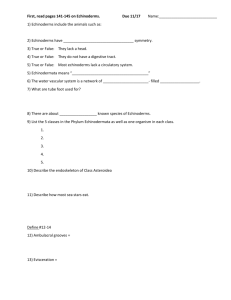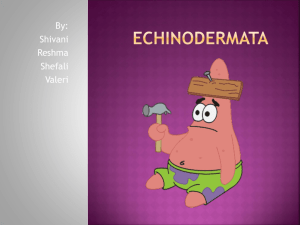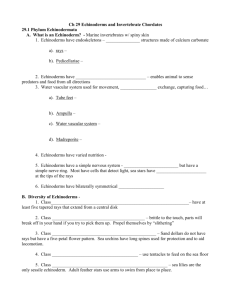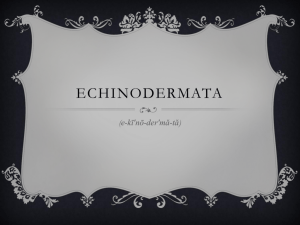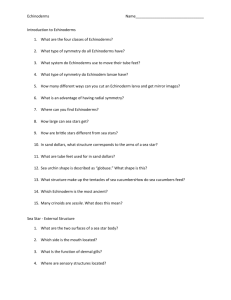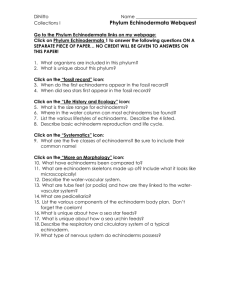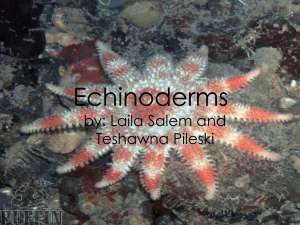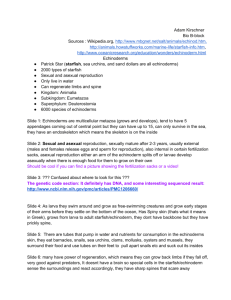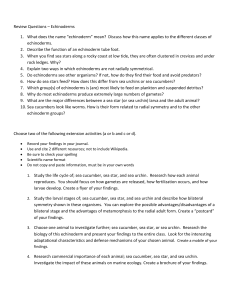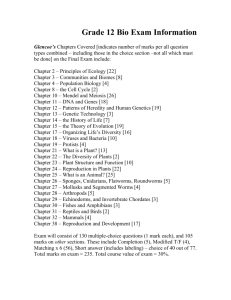Chapter 30
advertisement
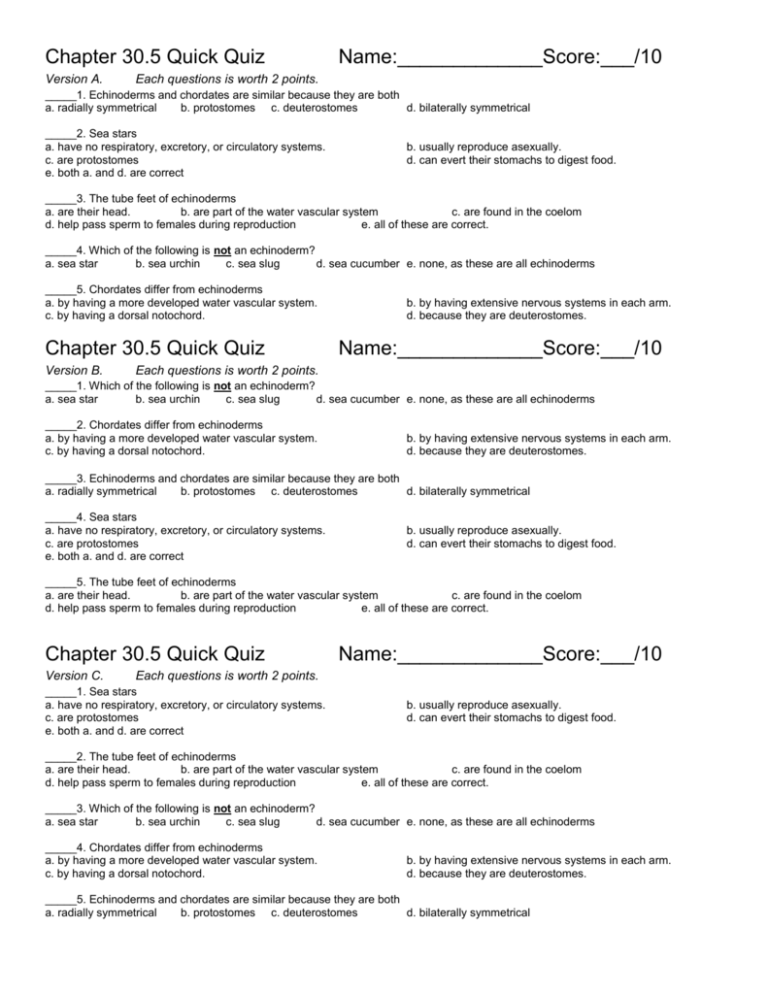
Chapter 30.5 Quick Quiz Version A. Name:_____________Score:___/10 Each questions is worth 2 points. _____1. Echinoderms and chordates are similar because they are both a. radially symmetrical b. protostomes c. deuterostomes d. bilaterally symmetrical _____2. Sea stars a. have no respiratory, excretory, or circulatory systems. c. are protostomes e. both a. and d. are correct b. usually reproduce asexually. d. can evert their stomachs to digest food. _____3. The tube feet of echinoderms a. are their head. b. are part of the water vascular system c. are found in the coelom d. help pass sperm to females during reproduction e. all of these are correct. _____4. Which of the following is not an echinoderm? a. sea star b. sea urchin c. sea slug d. sea cucumber e. none, as these are all echinoderms _____5. Chordates differ from echinoderms a. by having a more developed water vascular system. c. by having a dorsal notochord. Chapter 30.5 Quick Quiz Version B. b. by having extensive nervous systems in each arm. d. because they are deuterostomes. Name:_____________Score:___/10 Each questions is worth 2 points. _____1. Which of the following is not an echinoderm? a. sea star b. sea urchin c. sea slug d. sea cucumber e. none, as these are all echinoderms _____2. Chordates differ from echinoderms a. by having a more developed water vascular system. c. by having a dorsal notochord. b. by having extensive nervous systems in each arm. d. because they are deuterostomes. _____3. Echinoderms and chordates are similar because they are both a. radially symmetrical b. protostomes c. deuterostomes d. bilaterally symmetrical _____4. Sea stars a. have no respiratory, excretory, or circulatory systems. c. are protostomes e. both a. and d. are correct b. usually reproduce asexually. d. can evert their stomachs to digest food. _____5. The tube feet of echinoderms a. are their head. b. are part of the water vascular system c. are found in the coelom d. help pass sperm to females during reproduction e. all of these are correct. Chapter 30.5 Quick Quiz Version C. Name:_____________Score:___/10 Each questions is worth 2 points. _____1. Sea stars a. have no respiratory, excretory, or circulatory systems. c. are protostomes e. both a. and d. are correct b. usually reproduce asexually. d. can evert their stomachs to digest food. _____2. The tube feet of echinoderms a. are their head. b. are part of the water vascular system c. are found in the coelom d. help pass sperm to females during reproduction e. all of these are correct. _____3. Which of the following is not an echinoderm? a. sea star b. sea urchin c. sea slug d. sea cucumber e. none, as these are all echinoderms _____4. Chordates differ from echinoderms a. by having a more developed water vascular system. c. by having a dorsal notochord. b. by having extensive nervous systems in each arm. d. because they are deuterostomes. _____5. Echinoderms and chordates are similar because they are both a. radially symmetrical b. protostomes c. deuterostomes d. bilaterally symmetrical Chapter 30.5 Quick Quiz Name:_KEY__________Score:_10/10 Version A. Each questions is worth 2 points. _C___1. Echinoderms and chordates are similar because they are both a. radially symmetrical b. protostomes c. deuterostomes d. bilaterally symmetrical _E__2. Sea stars a. have no respiratory, excretory, or circulatory systems. c. are protostomes e. both a. and d. are correct b. usually reproduce asexually. d. can evert their stomachs to digest food. _B___3. The tube feet of echinoderms a. are their head. b. are part of the water vascular system c. are found in the coelom d. help pass sperm to females during reproduction e. all of these are correct. _C___4. Which of the following is not an echinoderm? a. sea star b. sea urchin c. sea slug d. sea cucumber e. none, as these are all echinoderms _C___5. Chordates differ from echinoderms a. by having a more developed water vascular system. c. by having a dorsal notochord. Chapter 30.5 Quick Quiz b. by having extensive nervous systems in each arm. d. because they are deuterostomes. Name:_KEY__________Score:_10/10 Version B. Each questions is worth 2 points. _ C ____1. Which of the following is not an echinoderm? a. sea star b. sea urchin c. sea slug d. sea cucumber e. none, as these are all echinoderms _ C ____2. Chordates differ from echinoderms a. by having a more developed water vascular system. c. by having a dorsal notochord. b. by having extensive nervous systems in each arm. d. because they are deuterostomes. __ C ___3. Echinoderms and chordates are similar because they are both a. radially symmetrical b. protostomes c. deuterostomes d. bilaterally symmetrical __ E ___4. Sea stars a. have no respiratory, excretory, or circulatory systems. c. are protostomes e. both a. and d. are correct b. usually reproduce asexually. d. can evert their stomachs to digest food. _ B ____5. The tube feet of echinoderms a. are their head. b. are part of the water vascular system c. are found in the coelom d. help pass sperm to females during reproduction e. all of these are correct. Chapter 30.5 Quick Quiz Version C. Each questions is worth 2 points. _ E ____1. Sea stars a. have no respiratory, excretory, or circulatory systems. c. are protostomes e. both a. and d. are correct Name:_KEY__________Score:_10/10 b. usually reproduce asexually. d. can evert their stomachs to digest food. _ B ____2. The tube feet of echinoderms a. are their head. b. are part of the water vascular system c. are found in the coelom d. help pass sperm to females during reproduction e. all of these are correct. __ C __3. Which of the following is not an echinoderm? a. sea star b. sea urchin c. sea slug d. sea cucumber e. none, as these are all echinoderms _ C ____4. Chordates differ from echinoderms a. by having a more developed water vascular system. c. by having a dorsal notochord. b. by having extensive nervous systems in each arm. d. because they are deuterostomes. __ C ___5. Echinoderms and chordates are similar because they are both a. radially symmetrical b. protostomes c. deuterostomes d. bilaterally symmetrical
